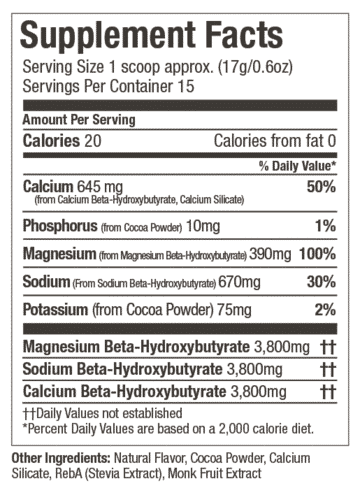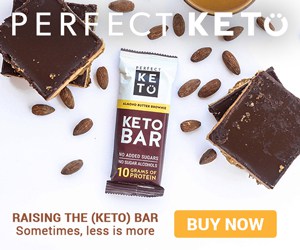It is normal to experience keto bloating especially during the early stages of the ketogenic diet. As your body adjusts to using fat for fuel bloating and constipation can occur.
When it comes to ketogenic supplements, the two most common are MCT Oils and exogenous ketones. Let’s take a look at each and why they may cause keto bloating:
MCT Oil Causing Bloating
MCT Oil is most likely to cause keto bloating if you haven’t taken it before.
As a concentrated fat source, too much MCT Oil at once can cause bloating, abdominal distention and diarrhea.
The best way to get around this is to start slowly. Start with 1 teaspoon of MCT Oil mixed in with a keto shake or keto coffee.
Build up slowly to up to 4 tablespoons of MCT Oil per day. Choose a high quality MCT oil, like Bulletproof, Perfect Keto or Kiss My Keto. You may find it easier on your stomach to start with a combination of C8 to C12 MCT oils, rather than just the C8 oil.
More Information About MCT Oils
- Can MCT Oil Go Bad?
- When to take MCT Oil for the Best Results
- How to Use MCT Oil While Intermittent Fasting
- Best MCT Oils for the Ketogenic Diet
Exogenous Ketones Causing Bloating
The primary reason why ketone supplements may cause keto bloating is dehydration.
Consumption of ketone bodies is frequently associated with the development of dehydration.
This is what leads to gastrointestinal distress and keto bloating.
Let’s take a look at how ketone bodies may induce dehydration:
Decreased Blood Glucose
According to a 2018 study published in the Journal of Physiology in, drinking a ketone ester, a type of ketone supplement decreases the levels of blood sugar.
A low blood sugar level increases insulin levels, allowing more fluid to be released from the body leading to weight loss.
Loss of Stored Water
The storage of carbohydrates and glycogen in the human body requires water.
One gram of glycogen requires approximately 4 grams of water to get stored.
Transitioning to keto supplements means moving away from using carbohydrates and glycogen to utilizing ketones and fats.
This leads to a loss of glycogen stores as well as water from the body, leading to dehydration.
Electrolyte Imbalance
The physiological reason behind depletion of the electrolyte imbalance during a state of ketosis is because of the failure to retain water.
Combined with other problems like frequent urination, the problem exacerbates.
The majority of keto supplements have a high amount of sodium which imposes a diuretic effect on your body. This alters the sodium and water ratios which may in turn cause keto bloating.
How can you Avoid Keto Bloating?
It is entirely possible to avoid keto bloating due to the use of ketone supplements.
The following practical cures will help you overcome all the major problems leading to keto bloating.
Drink Plenty of Water
Because dehydration is the basic reason why ketone supplements lead to keto bloating, the simplest way to cure it is to drink plenty of water.
It is normally advised to drink at least 8-10 glasses of water per day.
Correct Electrolyte Imbalances
Electrolyte imbalance is another reason why ketone supplements may cause keto bloating.
Take a look at the exogenous ketone supplements you are consuming. What is the balance of sodium, magnesium and calcium? Is the keto supplement too high in sodium, which in turn may cause water retention?
For example, Perfect Keto’s Exogenous Ketone Base has equal amounts of BHB’s.
There is 3,800mg of magnesium BHB, sodium BHB and calcium BHB per serving. This makes for a nice equal balance of exogenous ketones.
Sodium is most likely to cause fluid retention (and in turn keto bloating). For the Perfect Keto base, the 3,800mg of sodium BHB equates to 670mg of sodium in the body.
Compare this to Pruvit Keto OS Black Label which has a whopping 1270mg of sodium per serving. That’s almost double.
Eat Good Fats for Keto

As you are transitioning from carbohydrates to ketones for energy, it is normal to feel weak. To overcome this, eat more good fats for keto to provide your body with energy and make the transition easier.
Try keeping a food diary and noting what makes you feel bloated.
- Are you eating too much?
- Are you eating the wrong types of fats for keto?
- Is your diet not clean enough?
Try to stick to a whole food keto diet with plenty of fresh keto vegetables.
Consider that the bloating you are feeling on keto may be caused by something other than the exogenous ketones your taking?
Dairy foods are a common cause of keto bloating for some people. Lactose intolerance even in mild forms can cause abdominal distention, nausea and keto bloating.

Decrease use of Keto Supplements
Exogenous ketones must always be taken in moderation, especially when getting started on the keto diet.
Avoid crushing a full scoop of these supplements for the first time.
Instead, start with a minimal dose and gradually increase the dose in order to experience maximum advantages with minimal adverse effects.
Consider Ketone Esters
Supplements containing ketone salts are more likely to cause gastrointestinal side effects such as keto bloating.
Ketone esters have less side effects, but are more costly than exogenous ketone supplements.
Other Keto Supplements Side Effects
As with any other nutritional supplement, ketone supplements also have downsides and potential side effects.
That being said, these side effects are usually short lived and usually tend to improve as the supplementation with exogenous ketones becomes frequent and your body adapts to this.
Other side effects to be aware of while using ketone supplements include:
Halitosis (bad breath)
Not all exogenous ketone supplements are delicious.xogenous ketones are not delicious. When taken alone, the taste can be horrendous, pungent, or bitter. However, it is possible to mask this taste to some extent by using artificial sweeteners and other such agents.
To help fight this check out our guide on how to beat keto bad breath
Flatulence
Exogenous ketone bodies at extremely high doses can occasionally result in flatulence.
However, most of the studies that have documented this side effect used ketones mixed with a milky fluid which was not palatable.
Taking a moderate dose of ketone supplements, however, reduces this risk to a great extent.
Moreover, the risk of flatulence decreases as a user become accustomed to these supplements.
Hypoglycemia
Taking ketone supplements can lead to extremely low blood glucose levels.
However, the problem is not alarming and a user is rarely like to feel the symptoms of hypoglycemia.
This is because the levels of ketones are quite high and they successfully dominate as the preferred fuel for the brain.
Check Out These Popular Exogenous Ketone Products:
Related Questions
What are some other common questions about ketone supplements you may want to know?
How and when should I consume a ketone supplement?
Every brand has its own set of instructions when it comes to dosage.
Generally speaking, you can mix one serving of ketone supplements in water about 30 to 45 minutes before an exercise session to get optimum results.
For more detail check out this article.
How do I know if ketone supplements are working?
You can check if ketone supplements are working or not by measuring the blood levels of ketones with the help of a specialized meter.
Another way to check if you are in ketosis is by using a urine strip or a breath analyzer to detect ketones.
How long will Keto Bloating last?
It varies from person to person and depends on how much effort you are putting in to get rid of it.
Most of the time, bloating lasts for 2 days to a few weeks.
Can I consume carbs while taking ketone supplements?
You could, but you shouldn’t. Carbohydrates have anti-ketogenic effects.
As they enter the blood, carbohydrates are broken down to form glucose. This raises the blood levels of insulin and lowers the glycogen store hence, inhibits the generation of ketone bodies.
It is generally advised to consume less than 100 grams of carbohydrates as long as you use ketone supplements.
What are different types of ketone supplements?
Ketone supplements can be divided into two types:
Ketone Salts
In this type, the ketones are bound to a salt such as potassium, magnesium, calcium, and potassium. Ketone salts are mostly found in powdered form or mixed with a certain liquid.
Ketone Esters
Ketone esters are linked to another compound known as an ester and usually packaged in a liquid form.
Ketone esters have primarily been used in research and are not as common as ketone salts.
In 2020, ketone esters are starting to come onto the market. You can buy ketone esters on Amazon.
Keto Bloating and Keto Supplements – Final Thoughts
No matter which types of ketone supplement you prefer, always remember to follow dosing recommendations, stay hydrated, maintain your electrolyte balance, and listen to your body’s signals to maintain a healthy state of ketosis without bloating.
If you start experiencing GI stress, cut down the amount of supplement you are consuming and gradually increase the levels. Consider also a prebiotic supplement to maintain good bacteria in the gut, such as Bulletproof Inner Fuel.
Once you get to know about your options and understand the benefits of every supplement type, exogenous ketones can become an invaluable part of your life by helping you reach your goal easily and more quickly.






![Keto Fuel Review [2021 Update] | BHB CAPSULES](https://shortcutketo.com/wp-content/uploads/2019/05/keto-fuel-bottles-shortcut-keto.jpg)


